Unless you’ve been living under a rock, you know that around here, figuring out your Secret Sauce is a pretty huge deal.
That’s why I was so excited about the chance to talk with Erika Napoletano (the person behind the persona at RedHeadWriting.com). She’s got her own Signature Dish of unapologetic opinions and advice. And she’s developed quite the audience as a result.
If you’re still trying to figure out your branding (and you want to build a successful biz), you really need to read her latest book, “The Power of Unpopular: A Guide to Building Your Brand for the Audience Who Will Love You (and why no one else matters).” Erika’s written a great chunk of advice for the small biz owner who’s been afraid to narrow their marketing messages for fear of not appealing to a wide audience. She wants you to embrace who you really are in a strategic way, so that you can make faster connections with the people who matter (and who want what you’re selling). The book is full of great case studies that look at the little businesses who’ve created rocking companies because they stayed true to their core audience. She also walks you through some of the most important beyond-marketing basics like building a solid support team and dealing intelligently with the money part. What more could you want? The highlights from our conversation follow, but I highly recommend you listen to the entire interview here (there’s at least another 15 minutes of conversation, plus you’ll get the full Erika-Experience).
Nothing great has ever happened in my life when I jumped with a parachute.
— Erika Napoletano
Q: Let’s talk about our dorkiness. I was pretty unpopular in junior high school. I was 6 feet tall at the age of 13, wore glasses and got straight As. The other kids called me Four-eyed Sasquatch. And I spent all of my teen years desperately trying to fit in. How do we embrace and celebrate our quirkiness when we’ve spent so many years struggling to be likable?
A: I still have all my quirkiness, I just have a protective outer coating. The quirkiness and the awkwardness we have is crappy to have to deal with. But’s it’s also an incredible asset. The thing is, you have to turn it around. People ask me all the time: “Why would I want to build an unpopular brand?” And I tell them to look at the popular kids. They don’t think for themselves. All they do is follow each other, and they’re more concerned with what other people think than with who they are. The unpopular kids are the ones who learn how to build a really awesome set of survival tools. They’re leaders. They start things. They try new things. The popular kids never start anything until somebody else does it first. As adults, if we had to deal with being unpopular as kids, we’ve earned an incredible skill set to be resilient, to try new things — fail miserably and not think it’s the end of the world. Frankly, I think that being unpopular is one of the best assets I gained from my childhood.
Q: It’s a shame that it takes us so long to figure that out. I love being 6 feet tall now, but I can tell you it was murder in high school.
A: It stinks! How many years do we have to wait for the awesome to come out of unpopular? I remember back in junior high, my mom had entered us kids into a summer bowling league. And I found that I loved bowling. It was the most awesome thing in the world. And you got to wear this t-shirt. And you got all these patches that you could earn for things like getting three strikes in a row. And by the end of summer, I had this t-shirt that was covered with patches.
On the first day of school, my mom thought I should wear the t-shirt because she said it would help me make new friends. She thought it would be a conversation-starter. And you know what? It got the crap beat out of me on the school bus. This girl named Lisa started punching me when I got on the bus. She was like, “You’re such a geek. Stupid shirt.” Now, I’m 39 years old and I still love bowling. I went bowling about a month ago with a few of my alpha male friends and I whooped them both.
So for parents who are worried about their kids being awkward, let them discover themselves. Let them love themselves. And remind them that there’s nobody in the world they would rather be — except for superheroes, because superheroes are pretty flippin cool. I think adults need that reminder, as well. If you look at everything from pop culture magazines to t.v., we have all these messages telling us what we should look like, who we should we be and what we should enjoy. As intelligent human beings, we can come to those decisions ourselves, can’t we? I don’t think we need Kim Kardashian — God forbid — to tell us what kind of diet product we should be using.
Here’s the bottom line: every successful brand on the planet, every successful person is unpopular with a certain audience. And that unpopularity is an asset. It didn’t keep them from being successful. In fact, it’s the most powerful asset they have in their toolbox. Look at Apple. You’ll find people who will never buy an Apple product, but their stock just tipped $600 a share. I think the people they’re unpopular with are an asset. And the people who love them are carrying their brand message far and wide. Think of your favorite local coffee shop. There are people who will never go to that coffee shop because they have to have their Starbucks every morning. And that’s okay. It doesn’t affect that coffee shop’s bottom line. The people who know them and love them keep coming and coming. So, who are you building your brand and your life for? The people who never love you? Or the people who already want what you’re ready to offer?
Q: Exactly. And even when these brands get really big and popular with a lot of people — because let’s face it, Apple’s pretty popular these days — there will always be people who are going to hate on them, no matter what. I don’t think there’s ever going to be a time when you get so popular that there will be complete 100% acceptance of your thing.
A: Right. There’s a quote in Harry Potter where Dumbledore says, “Really, Hagrid, if you are holding out for universal popularity, I’m afraid you will be in this cabin for a very long time.” And that’s wisdom from a book written for kids. If you think about it, if you’re building something to be popular, you’re trying to please the wrong people. We have this very juvenile connotation of what unpopular means (mostly because of our childhood memories). But, we’re the ones making the inroads. We’re the ones ready to challenge the status quo. People like us who came before were the ones who created computers and cars and all the technology we enjoy. Where would we be without those people? If you’re looking for universal popularity, you really will be waiting for a very long time.
So why don’t you stop? Stop waiting for people to tell you it’s okay and give yourself permission to go and do what you want to do. You’re the only one who grants that permission. And when you get going, your audience grants that permission in return. Never forget that as business people, our audience is the reason that we are allowed to do business today, tomorrow and the day after that. And that’s why you build a business for the audience that’s going to love you. Because you respect that permission.
Q: I totally agree, Erika. But I’ve got a question here from one of our readers who’s feeling not very confident about that whole thing. He says, “I understand that it’s better to target a specific niche and that you’ll therefore look unpopular to the majority. But couldn’t it be helpful to gain general popularity anyway due to the friends of friends who know someone who would need your special product or service? Is unpopularity (to the majority) really a necessity for success? Or shouldn’t we try to explain our product even to those who aren’t our ideal clients?”
A: Absolutely not. And here’s why: I totally understand the fear that comes along with the word unpopular. And I’ll just tell you a little story. I’m an outspoken brand, I’m a gal with a foul mouth. I call ’em like I see ’em. I’m not everybody’s cup of tea. And that’s not saying you should build a brand that emulates mine. But there are some screw-ups and missteps that I’ve made along the way that you can hopefully learn from so you can make bigger and better screw-ups.
When I first started blogging back in 2006, I felt that it was gratuitous to blog. So I approached it from an apologetic stand point. I was thinking that nobody was reading what I was writing. And then when I realized that people were reading what I was writing, I didn’t want to offend anyone. And I felt like I was walking on egg shells. At that time, Twitter was very new. Twitter came online in 2007. And I got an account and began to tweet. But I always felt there was a filter on everything that I said.
Then, in 2008, we were in an election year. And something really stupid happened related to that and I couldn’t help myself. I responded “that’s efffing stupid.” And I spelled it out in all my usual f-bomb glory. And then I sent it out on Twitter. And the strangest thing happened. Not a single person chastised me for my language. In fact, I gained 25 new followers in the first 10 minutes. And people started talking to me. And those people are my audience.
So let me tell you what happens when you try to build a product for a super wide audience base. You’re ignoring your core users. You know who needs your product and you know the value that you have to offer. But the thing is that not even Walmart has something for everybody. So I think it’s pretty delusional and a waste of time to seek general popularity. You need to focus on the audience who’s going to love you. And it’s very cool, because I’m a living testament to it. 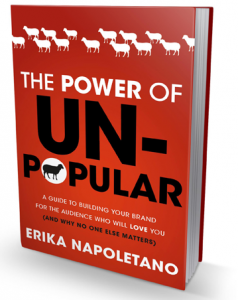
When you’re honest about developing something for the people who think like you and value the same things that you do, what they’re going to do is tell other people just like them. And then those people will tell even more people who are just like them. And what happens is you create a culture and an audience who loves you for who you are and what you have to offer. Not some candy-coated exterior.
Because what are you going to do one day? One day you’re going to be honest, and let slip who you really are. You’re going to piss somebody off. And then what will you do? Are you going to apologize? Are you going to stand by what you said? Are you going to say, “This is my company and this is what I believe in.” When you give an audience permission — an open door policy — to tell you what they think, they’re going to tell you. That’s a great asset to your brand.
Stop worrying about alienating people. You want to alienate people. You want to alienate the people who are going to make your life difficult. I don’t know about you, but I’m 39 years old and I’m tired of walking on egg shells. It’s the same thing I help big companies to do. I tell them your critics are incredible assets. You want that kind of differentiation in your audience base. Some people will like what you do and some people won’t. And that’s actually a good thing. So own who you are (and that’s coming from a foul-mouthed redhead who spent 17 years running other people’s businesses before running her own). I understand that fear. So get over it.
Q: Amen. I I love the fact that you focused on the little businesses in your book and not the behemoths. So much of what Coca Cola or Southwest does is not applicable to my audience. My clients are the solopreneurs, the one-person shops. Which of your case studies was your favorite?
A: In the chapter on scalability, we look at the story of Craig Wolfe. I think he’s possibly one of the most intriguing business people I’ve ever met. Remember the Coca-Cola polar bears from the 80s and 90s? They were everywhere and you could buy merchandise with those characters on all kinds of stuff. He was the guy behind that. Craig actually launched and ran the entire operation himself. He’s done it all without a single employee. Ever. So the important lesson is learn how to scale your business. I’m a solopreneur. It’s just this year that I can officially say I have a business partner. Even though we’ve kept our respective business entities separate, over 50% of my business is done with her. So how did I scale? And how did I grow? Here’s the single best advice I can give: read that chapter on personality in my book — that’s tried and true. That’s totally me. Being honest about who you are and running a business that serves your soul so you don’t have to be anybody else but you when you wake up in the morning? That’s the beauty of being a one-person shop. I’ll say this: I’m fortunate to have found a business partner who looks at me in all my loud-mouthed glory and sees an asset.
Q: I love the fact that you use yourself as an example. Because you work with a lot of big companies and they obviously love you. I’ve got more than a few clients who also market to larger corporations. But they’re afraid to inject their personality into their marketing. They tell me over and over they need to be “professional.” What would you tell them?
A: I’d tell them that big companies actually don’t want something bland. Nobody wants to do business with someone who does things in a bland way. If your clients are afraid to change up their marketing for fear of losing clients, ask them to just test it. Nothing great was ever achieved without first taking a chance. Tell them you can’t make anything happen for their business unless they’re willing to take a chance. Look at Lehman’s hardware. They sell nothing but non-electrical appliances. Their target market started off as the Amish community in Ohio. Now they’re a multi-million dollar company. That’s what happens when you stick to who you really are. They just kept looking for more of the right people who would listen to what they had to say. We need to ask ourselves: Who are we? What do we stand for? How do we make our customers realize that we really are approachable? Did you know Lehman’s is the number one destination in the country for musicians to buy a washboard? So they’re a music store, too.
Q: Like I said, it’s a great book. Every small biz owner should read it. So let’s tell them how they can get their hands on it.
A: I’d tell them to visit UnpopularBook.com — there are links all over the site for the different formats and places you can buy it. Plus — I don’t know about anybody else, but I’m 39 and I’m done with school. What I really hate is picking up books with all these worksheets that are just there to make you feel guilty for not filling them out. This site has a fully interactive forum where you can go online and ask questions by chapter, ask me or the other business owners who are featured in the book a question. Interact with the other readers and let’s take this conversation beyond the book.
***
Like I said, there’s more to the interview here. Don’t miss it.

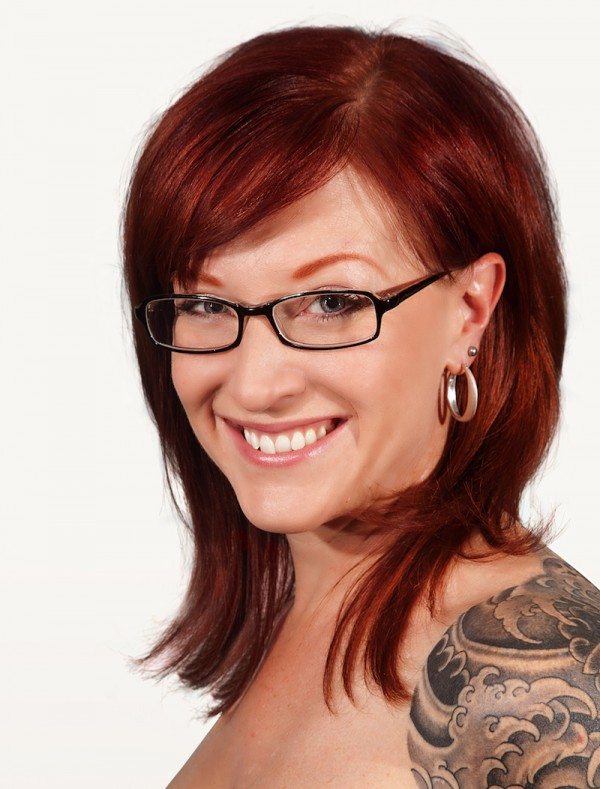
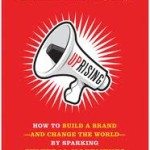




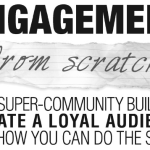
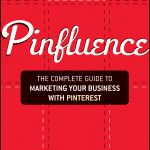


Love your premise Erika and I pray and sage your work (hahaha) so that it reaches a much younger audience. Too many youthful gifts are mired in the herd’s shit, delaying their triumphant entry into the marketplace. We tell our clients Authenticity=Distinction! – and then do the dance of joy every time they have the courage to be real, warts and all. PS Love your book design – credit to the designer!
My branding questions revolve (for a relatively new business) around what percentage of turnover you believe is right to spend on branding your business? Does the % vary according to industry type of is it just what you can afford in those early days to present your brand? So how do you plan what dollars to spend?
I was recently turned on to Erika via the Twitters and I love her! Thanks for this great interview. I recently went freelance, have been writing for ad agencies, and hope to do more writing for myself. My interest in reading Erika’s book and my branding question are intertwined: As I struggle to find a voice (and with client branding/creative dilemmas) I wonder, where do you draw the line between being unapologetically authentic and being offensive? How do you know how far is too far? I hope to win Erika’s book so I can hear her take on this – and because my book budget is much tighter these self-employed days!
Heh… I, personally, am someone who has resisted the allure of Netflix. Mainly because they still use “pop-up” ads (that is SO 1996!). But they’ve done fairly well despite being unpopular with me.
I’ve worked for a number of large nonprofit orgs that were all the most “popular kids” in our space. The less popular “kids” attacked us frequently and tried to steal away our friends by using many of the tactics you discuss. While I don’t blame them for trying, they are honestly doing a disservice to those individuals. Any advice on how to approach that?
Thanks for sharing this interview with Erika. here’s my question – What’s the best way to build your reputation for being competent when you’re someone who violates the norm for your business? I’m an attorney with my own firm. I prefer to be geektastic and meet with clients in jeans and t-shirts but my professional counterparts are known for being up tight and wear suits every day.
Thanks for sharing this interview with Erika. here’s my question – What’s the best way to build your reputation for being competent when you’re someone who violates the norm for your business? I’m an attorney with my own firm. I prefer to be geektastic and meet with clients in jeans and t-shirts but my professional counterparts are known for being up tight and wear suits every day.
Oh, Erika–you had me at “hello” but *completely* won me over with your “no-worksheets-in-the-book” stance. I’ve hated those damn things ever since I was in elementary school and they came in purple ink hot off the mimeograph machine. I remember thinking then, and continue to think now, that life is about so much more than filling in someone else’s blanks. Can’t wait to read your book.
I love the analogy that clarifies the message in this book. Everyone understands what it means to be unpopular at some time in their lives. The point is important: you have to turn some people off to really turn some people on, but it takes courage to be willing to alienate people. I’m intrigued about the case studies and will definitely buy this book.
I feel like I just attended the best pep rally on earth! ;)Three cheers, a pyramid stance, and a hip hip hooray for this …”The unpopular kids are the ones who learn how to build a really awesome set of survival tools. They’re leaders. They start things. They try new things. The popular kids never start anything until somebody else does it first.”Thanks for an outstanding interview with Erika, Tea — the kind of post that leaves you feeling vibrant, energized, and full of hope! I’ll exit with my branding question …I always read and hear “YOU are your brand”. So what’s the distinction between “personal” branding and “business” branding for solopreneurs? Thanks! 🙂
OK, so this interview resonated a bit with me. Maybe it is because I too am 39 and I still worry too much about alienating people, thus I walk on eggshells at times.I totally get the part about wanting to alienate people – those that are a roadblock rather than a help. It is just hard to do so sometimes. It is very easy to say to heck with them – it is another thing to actually do it…
This was a fantastic, inspiring, fun interview. As always Tea, you know how to pick ’em and how to ask ’em :)I’m going to buy the book because I am so not a worksheet-and-guilt kind of person and I love the real stories and real conversations. I also enjoyed your high school story. I often wonder if anyone on the planet actually has a good HS experience – and I’ll refrain from any dumb cheerleader references – but it’s so true yet sad that we spend all this time in our lives trying to squash the uniqueness out of ourselves so we fit in, then boom, real world, and the thing we were hated for is the thing that we HAVE to be if we want to stand out and be noticed. Ugh.So since you asked for a question, here goes. I think it’s super important to be true to who you are – no doubt. I also think it’s important to know your audience and stick to your focus even if there are haters. In the case of the hardware store, they survived and thrived in some ways by not following the trends. And so the question: how do you know when you’re “not following the trends” and when you’re just being stubborn to the point that it can be detrimental to your business? Take a company like Kodak. They “stayed true” if you want to call it that and it sent them into bankruptcy. Basically they outstayed themselves and the world moved on from their focus. So I guess how do you define that line before you end up in Chapter 11? Am I being focused and cheerfully unpopular or am I failing to evolve?
Hi Tea,Thanks for sharing this great interview with Erika. She is absolutely right about the importance of being yourself, being authentic and finding the people who love you the way you are. It saves so much time and you don’t have to worry about slipping up one day when the real you pops out. This is true in personal life as well as in business. My adult kids call me weird because I do things “my way,” which doesn’t always makes sense to anyone else. So I proudly accept my weirdness, and my friends who love that about it are drawn to me. Of course I think they are weird in certain aspects as well. Somewhere in my early adulthood I made a promise to myself to never stay on a job I hated, in a relationship that was withering, and a neighborhood that wasn’t pleasing. One year when I was between jobs, I quit a new job after one day because I saw that I could not embrace their way of doing business. This was not the ideal time to quit a job since I had just separated from my husband, still had 3 out of 4 kids at home, and suddenly no visible means of support (as they love to point out on detective shows.) but still a stack of bills. For me it was an easy choice: honoring the real me or pretending I was someone I would despise. I had confidence that I would find a satisfying way out of this financial dilemma, and I did.As a kid I spent too much time being on guard watching what I say around my parents, teachers and other adults. How stifling! Now I say what I want, although I do try to remember to check my spelling. Anything less than being myself is like trying to manage multiple lovers.(Not that I’ve had any experience with this. Tee hee.) It’s too much work trying to recall the right name at the right time. In my new endeavor as a publishing coach, being authentic is important. I’m currently working with Tea to sharpen my brand so that I communicate my value so that my rightful clients are drawn to me. My clients count on me to give them sound advice, but tell them the truth too. How freeing that is for me and them.